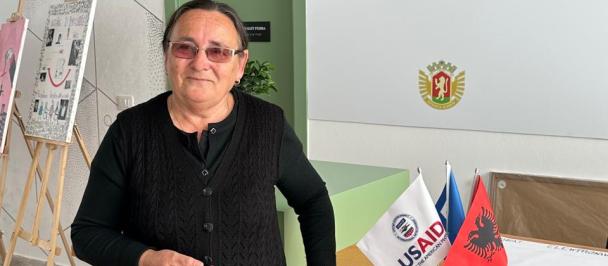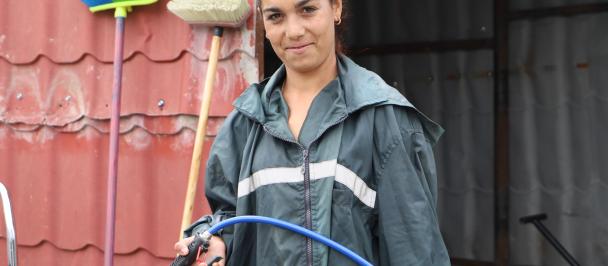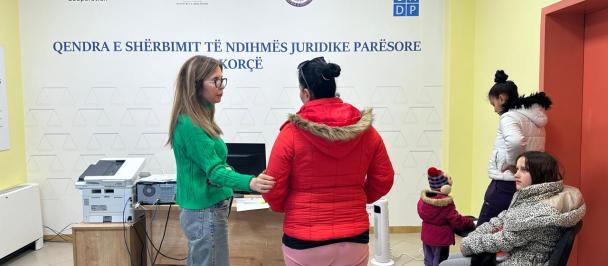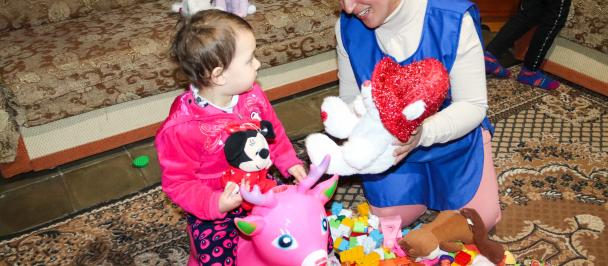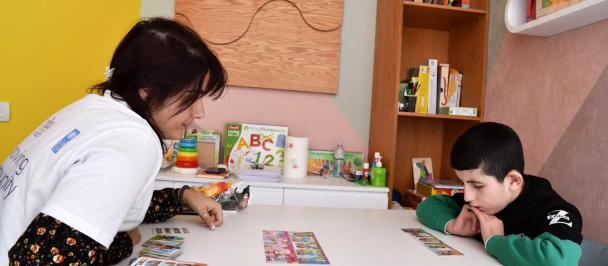UNDP Albania
More than just financial support: How start-up competitions in Albania boost entrepreneurial spirit of returnees
December 16, 2022
Berat Albania, November 2022, Returnees pitch their innovative business ideas in a competition for start-up support
In case of thousands of migrants and asylum seekers returning to Albania from Western Europe every year, many had decided to leave Albania, because they were unable to find work or were having trouble finding jobs that paid well. While a small percentage relocates permanently to Western Europe, vast majority of those that leave go back home. When they return, they find it difficult to adjust. Many have left their education unfinished when they left and opportunities for professional training are often limited. Returnees find it difficult to secure their livelihood even with the skills they have acquired abroad. Getting a loan from a bank or raising capital is nearly impossible for vulnerable returnees looking to start their own business with skills that they have gained.
Berat Albania, November 2022, Returnees pitch their innovative business ideas in a competition for start-up support
Giving the floor and tools to entrepreneurial returnees
Recognising the entrepreneurial potential of returnees, UNDP in Albania, Berat Municipality and the National Agency for Employment and Skills joined forces to organize the ‘start up’ competition with the aim of encouraging entrepreneurship among returnees. This initiative was organized in the context of the EU-funded project "Strengthening national and local systems to support effective social-economic integration of returnees in the Western Balkans" implemented in Albania, North Macedonia and Serbia.
Through UNDP assistance, successful applicants from the competition will be provided financial support of up to 500,000 Albanian Leke (app. EUR 4,300) for their start-ups, this seed funding will be provided in the form of goods. Also, all selected applicants will be supported to apply to other start-up programmes, funded by the Government of Albania, further increasing the chances of their business sustainability and success. Through this entrepreneurship programme, UNDP aims to address the gaps that returnees face when it comes to business support services and access to business networks and increase entrepreneurship among vulnerable returnees, Roma and Egyptian.
Entrepreneurial spirit and business acumen among returnees is present, as evidenced by large group of applicants in this competition: a total of 155 applications, and 55 from municipality of Berat alone. Supporting economic empowerment and self-reliance through entrepreneurship is one of the ways to help returnees secure livelihoods in their home countries and keep them invested in their domestic economies.
The ideas
Proposals pitched for funding included a variety of activities such as agriculture and livestock breeding, hairdressing, crafts, car wash, car mechanic and tire repairing services, clothing repair, grocery shops and other– are only some of 20 start-up ideas that were selected as winners of the contest.
During the selection process, priority was given to proposals pitched by women and youth, companies that can expand or complement existing local value chains, and companies that have a substantial impact on the environment or energy efficiency.
At the competition pitch, Roma and Egyptian women returnees displayed their knowledge, creativity, skills and business acumen. For example, Miranda Selmani, an artisan with nearly 20 years of experience pitched her idea to expand the range of handicraft products she produces, from pendants and earrings to crochet needlework. Laureta Myrteli presented her plan to construct a greenhouse based on her knowledge of organic farming. Other participants presented plans to expand and formalise their existing start-ups. Eduart Rroli pitched his idea to start his own tire repair shop in the same premises where he was once employed. The original shop owner had migrated leaving Eduart without work and Eduart is now competing for funds to buy the necessary equipment and offer the same quality service to existing customers.
Entrepreneurship programmes and start-up contests such as the one in Berat are more than just a competition to access seed funding (which is important). These events bring additional benefits to participants, including:
- Start-up competitions provide a platform for greater visibility and collaboration opportunities, which is important when starting a business, as to build a constituency of support and a network of potential clients and collaborators. These benefits are even more important for vulnerable groups, such as returnees, who more often are faced with limited social capital and business networks. For example, all outstanding ideas from the “start-up” competition in Berat will be published through the National Agency for Employment and Skills website, reaching a much larger audiences and increasing their chances for success.
- Aspiring entrepreneurs will receive training in entrepreneurship and business development, and mentoring support before and after the registration of the business. The UNDP project mobilised a network of experts that will support the new start-ups in areas that are considered critical for performance such as digitalization, product and service design, marketing and promotion, introduction of quality assurance systems, accounting and financial services etc.
- Start-up contests, such as the Berat one, are also a chance for returnees to meet with other, already successful entrepreneurs. Successful entrepreneurs are important as role models for young entrepreneurs experiencing difficulties in starting or scaling up their own business, and even more so if they come from vulnerable groups. In Berat, the advice and suggestions of owners of a successful local hospitality business, gave an extra dose of inspiration and ambition to the young aspiring entrepreneurs.
- These competitions also provide for strengthened communication between returnees and resident population - including their potential clients and value chain actors- and local authorities.
By supporting inclusion of vulnerable returnees in the labour market through entrepreneurship, start-ups can serve as an effective tool for returnee socio-economic reintegration into the community. For the returnees, starting their own business can offer a way to secure livelihood and gain a foothold for the coming generations. As the program in the municipality of Berat shows, returnees with their panoply of knowledge, skills and ideas need to be encouraged to show their ambitions. And what better way to do this than by giving returnees the floor, the skillset, the tools and some financial assistance to secure decent livelihoods in their home countries.
___
The Reintegration of returnees in the Western Balkans project is focused on addressing key institutional barriers for reintegration of vulnerable returnees, and drivers of social and economic exclusion and outmigration in the Western Balkans, such as limited work opportunities, low-paid jobs, large informal sector and poor quality of social services.

 Locations
Locations